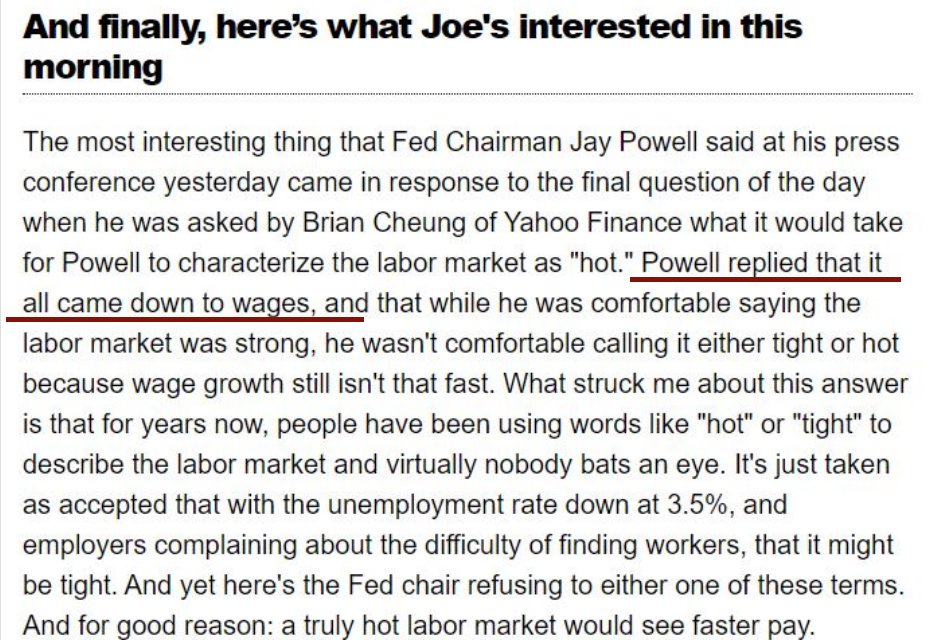
$600/wk Unemployment Insurance cannot deliver the benefits of a $600/wk Job Guarantee. From the outset, I should say JG is not a replacement for UI, no matter what you may have heard. I’ll get to this later, but read this long 🧶 w/ that in mind.
https://twitter.com/ptcherneva/status/1344035918596829185
Automatic stabilization: Both $600/wk UI and JG will provide counter cyclical spending. But UI will be weaker. Counter-cyclical stabilization is not just about the absence of income. It is also about the transmission and structure of economy
Firms don't like to hire the unemployed. Mass and long-term unemployment make the problem worse. JG would recover labor markets much faster than a UI of the same amount, both b/c of the higher direct, induced & tertiary employment effects & b/c of private firm hiring preferences.
JG stabilizes spending patterns better. Uncertain job prospects may mean more cautious spending from the unemployed compared to those w/ guaranteed jobs.
UI is temporary, which makes matters worse. Even if it were permanent, it still won't resolve the problem of job scarcity.
UI is temporary, which makes matters worse. Even if it were permanent, it still won't resolve the problem of job scarcity.
Nations who once achieved tight full employment through active labor market policies demonstrate that unemployment does NOT fluctuate the same way it does w/o them. Direct employment, ELR type policies diminish drastically/even eliminate these amplitudes (eg postwar Japan/Sweden)
So a permanent JG won't have to face a large flux of incoming/outgoing workers the same way they come and go out of the unemployment pool. If fluctuations still worry you, the culprit is the private sector. Want smaller fluctuations? Create better/more stable private sector jobs.
Scarcity of jobs: The labor market, even with more generous UI or UBI, will continue to be a cruel game of musical chairs. The invisible hand simply does not create enough employment opportunities for all. We have a visible hand, which we're not using, to make up the difference.
The public sector is vastly under-provisioned/understaffed. Govt functions must be adequately resourced & certain investments - socialized. And, I've insisted, JG is not a substitute for these necessary changes. While it will naturally be smaller w/ them, it will still be needed!
The threat of unemployment is a powerful tool of economic injustice. In my view, when one argues against the JG, they unwittingly argue in favor of all of the racist, sexist, ageist, homophobic & other discriminatory labor market practices that are used to ration scarce jobs.
Scarring effects of unempl are *very* large & extend to family of the unemployed. Most unempl costs are non monetary. Simple income replacement is wholly inadequate (UI or UBI). Whichever way we try to remedy scarring, w/o JG, we won't address the source of these specific probs.
It's not just about income (should be obvious). Survey after survey. A good litmus test: listen to ppl w/ disabilities: highest unempl rates, the worst discrim & barriers to jobs. Yet their demand for jobs is v high & (polls are clear) not b/c they provide income. Same for others
We can learn from European countries w/ generous & long-term UI progs, along w/ strong sectoral bargaining. They've been struggling w/ mass unemployment. Some are looking to tackle it w/ direct employment programs (France, Belgium, Austria). We'll likely see more of these progs.
There's so much & diff kinds of work to do. The idea that JG is "make work" or offers "fake jobs" to unproductive workers is, in my view, also racist (among other -ists). In many 'productivity critiques', there's always an underlying assumptions of who's 'employable' & who isn't.
A variant of this argument is that JG jobs must be inherently inessential, b/c people must come & go quickly (not a hurdle as already explained). Amplitudes will be much lower but ofc there are ways to scale up/slow down activities as needed.
Since there's permanent unemployment now, we should expect that there will be a permanent JG labor force. The flows in-and-out of the program will be like the flows from any other sector mpw, except in an economy operating at full employment. Where's the downside compared to now?
In the JG vision, everyone is employable, everyone can contribute to the public good, everyone has some skill & capacity to improve their own well-being & that of the community. JG aspires to value undervalued work. It also prioritizes participatory decision making & organization
When I say 'care work', I don't just mean caring for children or the elderly, but caring for the environment, communities, & *importantly* - for people. Care that they don't experience the ill effects of unemployment, among other ills. That's part of a care economy.
Ofc any program can be run badly and we've said this over and over. Just b/c public education fails some students doesn't mean that it's not needed. Just b/c public libraries struggle to provide needed community resources, it does not mean that they are not essential. Etc etc.
And as I started this long thread (thanks for reading), UI and JG are not "either/or" policies. My position has always been clear and no US advocate I know of has said the JG would replace UI. Both are voluntary programs.
We've seen how inadequate UI in the US has been during the pandemic. There is an argument for improving the UI system, but the case for the JG does not hinge on that. The safety net is missing the critical "employment" safety net that would target all the problems listed above.
Pandemic checks are not an alternative to JG. Nor vice versa. Apples & oranges. As I wrote in April, guaranteeing employment in a pandemic requires a multifaceted approach: 1) protect jobs/payroll, 2) prevent layoffs/pay cuts, 3) JG for the unemployed. levyinstitute.org/publications/g…
If we had the above, there will likely still be a case (tho weaker) for pandemic checks, and for diff reasons. E.g. many women left the labor force to care for children during remote schooling (btw, why didn't dads do the same in equal numbers? UBI isn't gonna kill patriarchy.)
Mainstream econ would call this exodus 'voluntary' but it isn't. It's under duress and brings onerous loss of income. Household care work must be supported. If short-lived, pandemic checks will do. But in general, univ child allowance & other caregiver assistance are better.
Finally, the JG enjoys overwhelming bipartisan support. And there is no just transition to a green future without it. It is why the JG has always been 'green' and is now a cornerstone of the #GND. People want jobs (among other basic preconditions for self determination).
We could of course continue to deny this reality & the validity of these claims, along with the JG's democratizing potential. We know what a world of guaranteed UNemployment looks like.
Or we could choose differently. Thanks for reading. For more: amazon.com/Case-Job-Guara…
Or we could choose differently. Thanks for reading. For more: amazon.com/Case-Job-Guara…
• • •
Missing some Tweet in this thread? You can try to
force a refresh






